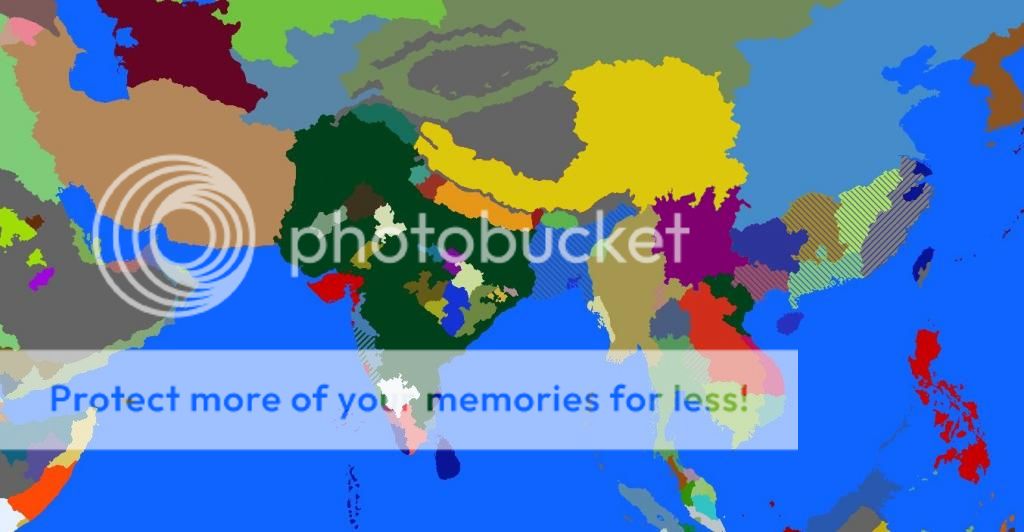Thank you everyone for the comments and thank you very much for reading!
From Jean d’Ancelle’s France In The World of the Enlightenment, published in The University of Sacremont, 1985
The modern era unfurled in all its glory and horror in the period immediately after the Franco-Dutch War. This war, which was fought across the world, ended the expansion of the Dutch and created the international structure which would remain for the rest of the century: two superpowers, the English and the French, who possessed colonies around the world, and a series of minor powers, who had few or no colonies. Thus, before I discuss the events which occurred in France during the Colbert Administration, I feel the need to discuss the world which these events take place in.
A final note before I begin discussing this: there has, as of late, been a controversy in the Quebec historical community which I cannot help but comment on. There has been a movement which has drawn on European theories in order to criticize traditional history, which has criticized leading Quebecois politicians, which has been banned in several universities.
Many of my students, and many journalists, have asked me what my opinion on this movement is. I shall say it here: it is dangerous. To judge history on categories made by our modern society is not to write history, but rather to bias the past with modern notions. I merely recount events with what information I have, in as unbiased a fashion as is possible. To do otherwise is not only not historical, it pollutes the discipline of history with a questionable political agenda. And because each theory is seen as ‘equal’ to the others, each and every thing is seen as ‘up for questioning’. What is the result of this? If anything can be questioned can anything be true? If anything can be true how are we to be unbiased? I pride myself on my lack of bias, and I will endeavor to describe to you, the reader, only events of importance, regardless of the sex or race of those who participated in them.
With that said, I will get on to a discussion of the three regions of importance to our study at the beginning of Colbert’s regency: Europe, the Americas, and Asia*. I will discuss each in turn.
Europe
Europe at the end of the Franco-Dutch War
Europe faced the beginning of a new era at the end of Louis XIII’s reign. The slow decline of France under Henri II, and its laggardlyness during the reign of Louis XIII, was immediately halted with France’s victory in the Franco-Dutch War, against each of the north German powers. Within a short period of time, France went from a declining power, who’s trade was being assaulted in the Atlantic and Indian Oceans and who could barely defend her own borders, to a world-wide power.
With Bourbon’s on the throne in the Netherlands and Naples, and French aligned parlements in Switzerland and the Confederacy of the Rhine, France was once again the center of the world, with all the riches of both her colonies and the colonies of the Dutch. They are not the only alliance system, however; there are two rivaling alliances as of the 1680s: the old Holy Coalition and the Saxon-Anglo union.
The Holy Coalition, between Habsburg Iberia and Austria and Medici Italy, had existed for sixty years at this point. It was originally conceived by Matthias II, in an attempt to wrest France’s old ally Modena away from her by tempting Ferdinando de Medici with a crown. This ended up succeeding and, at least on the surface, the alliance was still strong: Italy had gained a crown and official backing of her colonies from it, Iberia had gained backing for her new Imperial status, and Austria had gained allies who had helped in the retaking of Hungary. However, each country had diplomatic and internal difficulties to deal with; difficulties which in time would tear the alliance apart.
Italy for its part hadn’t been under centralized leadership since the Lombards, and even during the times of the Italian Coalition, separate principalities and republics were allowed to separately set up colonies. The Italian tendency towards independence, especially in the north where the Milanese and Savoyards were recent additions to the primarily Tuscan political culture led to four revolts over the 1670s and 80s, and brutally repressive measures had created a large Italian diaspora which primarily went to France. Beyond this, while Ferdinando had been content with the royal title given to him by the German Emperor, his son Cosimo was now looking covetously towards the still Austrian territory of Venezia.
Austria was still a patchwork of duchies, counties, and municipalities that no Emperor had tried to centralize. While nominally an ‘Absolute’ kingdom, they hadn’t proven themselves as such like the Italians or French, and thus had great issues finding money or manpower in the corners of her empire, especially in the newly reconquered areas of Hungary and Silesia.
The Iberian Empire was also a new nation, formed after Spain conquered the last traces of the Portuguese kingdom. However, she was an Empire in name only: not only did she have similar problems to the Austrians in her lack of centralization and thus lack of a tax base, she had also defaulted twice over the last decade due to the loss of her East Indies colonies to the Dutch (who then lost them to the French). Iberia would not be the last nation to fall into fiscal disarray due to lost colonies, she would just be the first.
The newest major alliance was the Saxon-Anglo Union, between the Grand Duchy of Saxony and England. This was the product of the Glorious Revolution which unseated the French-aligned Stuarts and replaced them with Augustus of Saxony. Under the House of Saxony, England’s attention was brought back to the continent, she reformed her army and navy, and created a new tax system which included a portion of landed wealth. This personal union (which in the 1680s would soon give way to a slightly looser union as Augustus’ split his kingdom among his two sons, John George and Frederick Augustus) would become the primary foe of France as time went on, and soon enough the English model would become vaunted across Europe. The reason for the Saxon-Anglo alliance’s strength, however, did not come from taxes alone, but rather the gold England gained from her overseas colonies.
The Saxon-Anglo Union
The Americas
The Americas in 1687
The Franco-Dutch war spelled an end to the Dutch colony of New Zeeland in what is now Nouvelle France and the Commune of Manhatta. Beyond this, battles between the French and the English in the Southern Atlantic led to the realization of great wealth in the Pacific Ocean. And so, as the 17th century turns to the 18th, we see that there are four great powers in the New World: the Netherlands, England, Iberia, and France. However, the map would deceive you, as Iberia’s bountiful colonies are now as grand as they appear. As Dutch, French, and English merchants and privateers began coming in through the Caribbean and South Atlantic, Iberia’s colonies became a hollowed out shell who provided more wealth to the aformentioned traders than they did to the Iberians themselves. Beyond this, France’s newly bought right to trade slaves to New Spain and Peru led to massive personal wealths among traders such as Franceau de Berry and Renault de Vauban (Sebastien de Vauban’s adopted son).
Over the 16th and 17th centuries, the American colonies had been mostly kept alone. They sent tariffs back and some new world goods, but the metropoles rarely interfered in their domestic politics. This would begin to change over the 18th century, as France, England, and Iberia began emulating the reforms enacted by the Dutch, who turned their colonies in Louisianna and Brasil into extractive centers for goods like coffee, brasilwood, furs and tobacco. As this was repeated and the metropole began centralizing power over her American colonies, independence movements started to form. This struggle, between the European colonizers and the colonized, would form one of the great conflicts of the 18th century.
Asia
Asia in the 1680s. In southern China, Scandinavian protectorates are highlighted in backward diagonal stripes and French protectorates in forward diagonal stripes
The last half century had narrowed down the number of colonizers in the East Indies considerably. Discounting the Italian pearl trading ports in the Persian Gulf and spice trading ports in Giava, there are three major colonizers in the East Indies: France, England, and Scandinavia. The most major of these are the Chinese protectorates, formed when France and Sweden intervened in the Qing Dynasty’s attempt to wrest control over the Ming. The main theme of the East Indies and the colonies there is
precarity: all of the European colonizers had small colonies which bordered against far greater local powers, but those local powers had issues of their own.
In India, the Second Timurid Empire had collapsed, leaving a group of central asian Khans to fight over the old empire’s power base and two new powers along the Indian Ocean: Persia and the Mughals. The Mughals are more important as they had moved rapidly into India, taking back the old Empire’s strongholds and new land in southern India, but unlike the Timurids they had no major Islamic power base to gain troops from and most of their armies were Hindu. This played a major role in the Revolt of the Mirzas, as southern and eastern Indian princes attempted to gain independence, a struggle which is currently underway.
In China, the protectorates are facing culture shock as they were pummeled with European culture, and though they are independently weak, they face a Qing Empire who itself has many enemies. The Qing, who never fully gained the Chinese ‘Mandate of Heaven’, face local struggles alongside their everlasting war with the Ming (who retreated to Tibet) and the Mogai Khans.
As European interest in foreign trading items grew, the centralization of the colonies which will occur in the Americas will also occur in the East Indies. Colbert had already forced the French East India Company to relocate to Paris, and the Scandinavians would soon look upon their protectorates in Bengal and south China as yet more extractive colonies. The results of this are as of now unclear, but given the precariousness of European colonization in the area one must wonder why the European kings chose to embark on such a questionable path.
That is the shape of the world as Colbert comes to power. In the next chapter, I will discuss Colbert’s economic policies, which would mark France for the next two hundred years.
*
d’Ancelle’s lack of discussion of Africa and the slave trade is purposeful, I’m going to write a segment on the slave trade later










